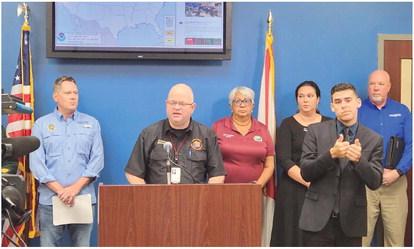Got generator? How to run it safely
Here’s hoping you aren’t reading this by candlelight.
(Actually, don't do that, candles are dangerous in the wind. Use flashlights.)
Florida is a big, odd-shaped state — and Hurricane Ian has seen fit to affect just about all of it.
Osceola County is served by three power companies, who all say they’ve hardened their resources to limit or shorten outages.
Kissimmee Utility Authority (city limits of Kissimmee, just east of town and along Pleasant Hill Road) reports that mutual aid crews from Minnesota are currently on standby to provide assistance with potential restoration efforts.
“Once the storm passes, our crews will begin their damage assessment analysis to determine if additional assistance is needed,” a KUA release from Tuesday said.
fastest way for customers to quickly report power outages to KUA is to text the word “out,” to 877-582-7700. KUA will have a real-time outage map at www. kua.com/map.
OUC serves much of St. Cloud, and its outage alerts make sure customers have power restoration updates at their fingertips via text message. Customers can do so by texting REG to 69682 or visiting OUC. com/alerts. Customers should log in to their my.OUC.com account to make sure contact information is current.
Duke Energy serves much of the Poinciana area. Customers who experience a power outage can report it by: Visiting duke-energy.com on a desktop computer or mobile device; Use Duke Energy App from a smartphone via Apple Store or Google Play; Text OUT to 57801; Call the automated outage-reporting system, at 800-228-8485.
Services: St. Cloud Police Chief Doug Goerke told the St. Cloud City Commission at a special Monday emergency meeting that he’d be out riding patrols with his officers during the storm as long as it’s safe and practical for the conditions. Sheriff Marcos Lopez said much the same thing on Tuesday about deputies, who will be out and about, or serving at shelters or emergency centers. That threshold is generally 45 mph.
Past that level of wind, police and ambulances will stay sheltered until conditions are safe to be out and about. (Check AroundOsceola. com, Facebook @ osceolanewsgazette and Twitter @AroundOsceola for what updates we can provide, based on power and availability.)
Generator Safety:
OUC has provided some safety tips for running your generators: Select a Safe Spot. Never run a generator in an enclosed space or indoors. Most generator-related injuries and deaths involve carbon monoxide poisoning that can build up. Always place a generator at least 20 feet from your house — and never in an attached garage — with the engine exhaust pointed away from windows and doors.
Never plug a generator directly into your home’s outlets because it could re-energize power lines. This could endanger the lives of your neighbors who may be served by the same transformer and tree-trimming and utility crews working to restore power in your area.
Obey all local, state and national electrical and fire codes. You may not be aware, but it’s against the law and a violation of electrical codes to connect generators to your home’s electrical circuits without approved automatic-interrupt devices.
Do not run a portable generator in rainy or wet conditions.
Be fore re fuel i ng, turn off a gas-powered generator and let it cool. Any fuel spilled onto a hot surface could ignite. And a cool generator decreases the risk of burns while refueling.
Keep children and pets away from generators, and always keep a fully charged fire extinguisher nearby.
Florida Agriculture Commissioner Nikki Fried is encouraging all Floridians exercise caution when using or transporting fuel, with tips such as: Refill fuel containers on the ground, not in the truck bed or trunk. Transport and store fuel ONLY in appropriate containers – look for DOT approved containers that close tightly and do not leak. NEVER store or transport gasoline in milk jugs or open top containers.
Store fuel in a safe and well-ventilated location.
Report Outages/ Quality: To report fuel outages or quality issues before or after a hurricane, consumers should contact the department’s Division of Consumer Services at 1-800-HELP-FLA,1-800-FLAYUDA en Español, or FloridaConsumerHelp.com.
Clean-up and repair scams: After disasters, unlicensed contractors and scammers may appear with promises of quick repairs, clean-up, and debris removal. Some may demand upfront payment and not do the work, claim you’ll get a discount but quote outrageous prices, or lack needed skills. Before you do business with any company providing these services: Do your research: Ask for IDs, licenses, proof of insurance, and references. See if local contact information is on their trucks. Check with FDACS’ Division of Consumer Services for complaints.
Get another estimate: Check if other companies offering similar services are providing quotes with comparable prices. Review contracts carefully: Ensure all promises a company makes are in writing and that you understand what you’re signing. Never use cash: Always pay with a check or a credit card and never make the final payment until the work is complete.




